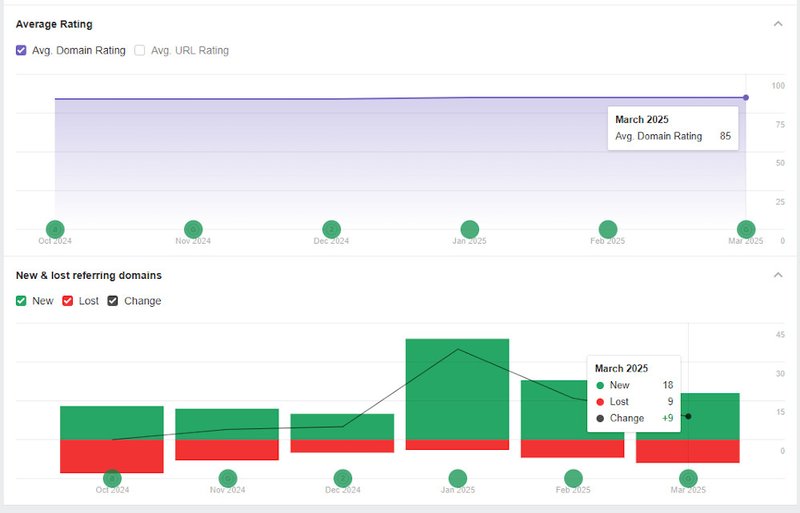Best Moz Alternatives: Ahrefs, Semrush, SE Ranking & More Compared
- Home
- Knowledge Sharing
- Best Moz Alternatives: Ahrefs, Semrush, SE Ranking & More Compared
What are the best alternatives to Moz for SEO professionals in 2025?
Let’s say you’ve been using Moz for years, but now you're starting to wonder — are there better tools out there for 2025? Maybe you’ve hit a feature ceiling, or the pricing feels a bit steep for what you’re getting. Either way, it’s the right time to explore alternatives. And not just any tools, but ones SEO professionals actually trust and use daily.
Take SE Ranking, for instance. It's become a go-to for many mid-sized agencies because of its all-in-one dashboard, real-time rank tracking, and flexible pricing. Ahrefs, on the other hand, remains a heavyweight in backlink analysis, offering a massive link index and in-depth keyword data. Then there’s Semrush — a tool that's almost become synonymous with digital marketing itself, thanks to its broad toolkit covering SEO, PPC, content, and social.
To get a clearer picture, here’s a comparison table showing how the top alternatives stack up against Moz:
| Tool | Features | Pricing | Support | User Experience |
|---|---|---|---|---|
| SE Ranking | Rank tracking, audits, backlink checks | From $39/month | Chat, Email | Intuitive, fast updates |
| Ahrefs | Largest backlink index, content explorer | From $99/month | Ticket-based | Power-user focused |
| Semrush | All-in-one suite, ad data, trends | From $129.95/month | 24/7 Chat, Phone | Comprehensive but complex |
| Mangools | Simple UI, good for beginners | From $29/month | Very easy to use | |
| Serpstat | Solid for keyword research + audits | From $59/month | Chat | Fast, clutter-free dashboard |
In an expert round-up on SEO Roundtable, digital strategist Mark Preston noted: "Moz was a trailblazer, but today’s SEO professionals often need more depth in link analysis and fresher data — something Ahrefs and SE Ranking offer consistently."
Digging into user reviews across Reddit’s r/SEO and BlackHatWorld reveals that many professionals are moving to SE Ranking or Semrush for daily operations. Moz still gets credit for its ease of use and beginner-friendly setup, but advanced users often point to a lag in updates and limited functionality in certain areas.
How does SE Ranking perform against Moz for keyword tracking and audits?
Imagine launching a campaign and needing up-to-the-minute data on keyword movements. That’s where SE Ranking tends to outshine Moz — especially in 2025, when speed and accuracy are non-negotiables.
Both tools offer keyword tracking, site audits, and reporting, but the depth and execution differ. SE Ranking allows for daily tracking, geolocation-specific data, and even mobile vs desktop breakdowns. Moz tracks keywords reliably, but less frequently, and lacks some customization SE Ranking provides.
Take this breakdown:
| Feature | SE Ranking | Moz |
|---|---|---|
| Keyword Tracking | Daily updates, device/location | Weekly updates, less flexibility |
| Site Audit | Deep crawl, JavaScript rendering | Good crawl, limited JS handling |
| Reporting | Fully customizable PDF/HTML | Standard templates |
| Integrations | GA, GSC, Zapier, Data Studio | GA, GSC |
And here’s what SEO consultant Amanda Rosen said in a webinar by Search Engine Journal: “SE Ranking’s site audits are far more technical. I’ve used both tools for client projects, and SE Ranking digs deeper into crawl issues, JS rendering, and server responses. It’s a level up.”
User reviews on G2 confirm this, with SE Ranking averaging a 4.8/5 rating for keyword tracking alone, while Moz sits around 4.2. One user even pointed out that Moz’s updates sometimes lag, which can mislead if you’re managing high-stakes campaigns.
Screenshots from both dashboards show the difference — SE Ranking gives you multiple charts, data filters, and export options right on the tracking page. Moz, by comparison, offers a cleaner interface but fewer drill-down options.
Is SEO Moz still a competitive choice in today’s SEO landscape?
So, let’s be fair — Moz still has loyal users. And there's a reason for that. If you're a beginner or working with local businesses, Moz’s simple workflows and clear scoring system can be a plus. But for seasoned professionals juggling multiple campaigns? The landscape in 2025 has moved forward.
Historically, Moz was a pioneer. Their Domain Authority metric set the tone for how SEOs evaluated link strength. But since then, other tools have caught up — and arguably surpassed — Moz in data volume and flexibility.
Experts like Lily Ray (SEO Director at Amsive Digital) have noted that Moz remains a good entry-level tool but lacks real-time data and competitive intelligence depth. In a Twitter thread, she remarked: “Moz is fine if you want basics. But for aggressive, data-driven SEO, you’ll outgrow it fast.”
Reddit threads often echo the same sentiment. Posts titled "Is Moz still worth it in 2025?" are common, with replies citing better pricing models and feature sets elsewhere. Most pros agree: unless you're tied to the Moz ecosystem, exploring other tools can unlock better value.
Still, Moz Pro is not without merit. Their Keyword Explorer is intuitive, and the Link Explorer remains a solid, albeit smaller, index. But in an era where real-time decisions matter, Moz’s pace feels a step behind.
Which tool is stronger in backlink analysis: Moz or Ahrefs?
Now for the big one — backlink analysis. This is where Ahrefs almost universally dominates. Their link index is not only larger but updated more frequently. In contrast, Moz’s Link Explorer, while easy to navigate, often trails in freshness and volume.

A look at actual numbers tells the story. Ahrefs claims to crawl 8 billion pages daily, with over 400 billion indexed links. Moz’s index is smaller and updates at a slower rate. This affects how quickly you can respond to new link building or spam threats.
According to a study by Authority Hacker in late 2024, Ahrefs showed 20–30% more referring domains in tests across various industries. The filtering options in Ahrefs are also more robust — you can segment by link type, language, traffic, and more. Moz offers filters too, but not at the same granularity.
Here’s a side-by-side snapshot:
| Metric | Ahrefs | Moz |
|---|---|---|
| Index Size | ~400B links | ~400B links |
| Update Frequency | Daily | Weekly or biweekly |
| Filter Depth | Extensive (by traffic, type) | Basic (by DA, spam score) |
| Reporting | Customizable, exportable | Limited to standard reports |
Feedback from forums like WebmastersWorld and r/SEO often praises Ahrefs for showing “links Moz missed” and for better spam detection.
As Ahrefs founder Dmitry Gerasimenko once said: “SEO lives and dies by the freshness of its data. That’s what we built Ahrefs for.” That philosophy continues to resonate with SEOs who prioritize real-time insight over brand legacy.
In summary? Moz still works for basics. But when backlink data drives strategy, Ahrefs wins — hands down.
What separates Moz Pro from Semrush when it comes to content and site audits?
Let’s say you’ve got a site that’s bleeding traffic. You need answers — fast. This is where the real difference between Moz Pro and Semrush becomes glaringly clear. Both claim to audit your site and guide your content strategy, but the tools they give you — and how deep they go — are miles apart.
Moz Pro leans into clarity and beginner-friendliness. Its site audit tool prioritizes crawl accessibility and common technical issues like broken links, missing tags, and redirect loops. Content optimization focuses mostly on keyword targeting and basic recommendations. You get a nice visual dashboard and a list of prioritized issues, but you won’t find nuanced metrics like content readability or semantic density.
Semrush, on the other hand, feels like it was built for SEOs who want control and depth. Its Site Audit tool crawls pages with impressive granularity. You’re not just getting warnings — you’re getting a breakdown of internal linking, HTTPS implementation issues, JavaScript rendering flaws, and Core Web Vitals. The Content Audit tool pulls in Google Analytics and Search Console data to evaluate performance based on traffic, bounce rates, and rankings.
Here’s a structured comparison:
| Feature | Moz Pro | Semrush |
|---|---|---|
| Site Audit Depth | Basic technical issues | Comprehensive technical breakdowns incl. Core Web Vitals |
| Content Optimization | Keyword-based recommendations | Integrates user behavior metrics and semantic analysis |
| Reporting Format | Visual + PDF exports | Custom dashboards, export to Google Looker Studio |
| Integration Options | GA, GSC | GA, GSC, Trello, Zapier, Looker Studio, and more |
| Crawl Frequency | Weekly | Daily or on-demand |
According to SEO specialist Julia Martinez, interviewed in a recent DeepCrawl webinar: “Moz is great if you want a clean report fast. But for serious campaigns, Semrush gives you diagnostic precision that’s hard to beat.”
Users on SEO forums like Traffic Think Tank often point out that Moz’s reports, while well-designed, sometimes oversimplify errors or skip things entirely — especially when it comes to dynamic rendering or mobile usability. Semrush, in contrast, will catch those and flag issues with detailed context, often linking to external documentation for fixes.
Screenshot comparisons between their dashboards make this obvious. Moz’s audit UI shows a simple breakdown of issues, like missing alt tags or duplicate titles. Semrush’s dashboard? You’re met with a list of thematic issues, affected URLs, severity levels, and even trends over time.
So, what really separates them? It’s the level of control, integration, and audit depth. Moz helps you fix surface-level issues; Semrush helps you debug your entire strategy.
Which platform dominates in the Ahrefs vs Semrush vs Moz comparison?
Imagine sitting at your desk with all three tabs open — Ahrefs, Semrush, Moz — and asking yourself: which one’s worth the subscription? Turns out, it really depends on what you're solving for.
Let’s break this down across major categories like features, usability, pricing, and support. That way, it’s easier to see the strengths and weaknesses without getting lost in branding.
| Feature/Category | Ahrefs | Semrush | Moz Pro |
|---|---|---|---|
| Backlink Analysis | Industry-leading index, fast updates | Large index, useful filters | Smaller, slower index |
| Keyword Research | Deep SERP data, clickstream models | Broad toolset, ad data, trends | Simplified interface |
| Technical Site Audits | Limited (but improving) | Deep audits incl. Core Web Vitals | Basic checks |
| Content Optimization | Content Explorer only | Full audit, optimization, topic research | Keyword suggestions |
| Pricing | From $99/month | From $129.95/month | From $99/month |
| Learning Curve | Moderate | Steep | Beginner-friendly |
| Support | Ticket-based | 24/7 chat + phone | Chat + help center |
In a panel on SEO tool ecosystems hosted by BrightonSEO, consultant Rebekah Dunn summed it up this way: “Ahrefs wins for link building. Semrush is unbeatable for multi-channel campaigns. Moz is fine if you’re early-stage.”
User testimonials from Reddit’s r/bigseo reflect the same vibe. Ahrefs gets praise for speed and depth of link data. Semrush wins accolades for being an all-in-one toolkit that goes beyond SEO. Moz gets points for clean UX but also criticism for being "just enough" in advanced campaigns.
Verdict? If you need to go deep into content, audit, and paid media, Semrush dominates. If backlinks are your bread and butter, Ahrefs takes the crown. Moz still serves a purpose, but mostly in less complex scenarios.
Is Raven Tools a suitable technical SEO alternative to Moz?
At first glance, Raven Tools might look like a light version of Moz — but don’t underestimate its audit engine. For teams focused on technical SEO, Raven actually brings some unique advantages to the table.
While Moz focuses more on clarity and beginner-friendly metrics, Raven leans heavily into reporting detail. Its Site Auditor uncovers over 20 types of technical issues, from missing tags and meta problems to image optimization flaws. The page speed insights are powered by Google Lighthouse, offering a real-world snapshot of how your pages perform.
Integration is another differentiator. Raven Tools connects easily with GA, GSC, Bing Webmaster Tools, Majestic, and even social accounts. That makes it a solid choice for agencies wanting a unified report view across platforms.
Here’s a comparison table:
| Feature | Raven Tools | Moz Pro |
|---|---|---|
| Site Audit Detail | 20+ issue types + page speed insights | Core technical issues, no speed data |
| Integration Options | GA, GSC, Bing, Majestic, social | GA, GSC |
| Report Customization | High (white label, PDF, dashboards) | Medium (PDF export only) |
| Data Refresh Frequency | Daily or on-demand | Weekly |
| Page Speed Metrics | Yes (Google Lighthouse) | No |
In an interview with AgencyAnalytics, consultant Ravi Ramaswamy said: "Raven doesn’t try to be everything — it focuses on making audits clean and shareable. That’s perfect for client reporting.”
Review threads on platforms like G2 and Trustpilot reveal a consistent pattern: Raven Tools is appreciated for its detailed, shareable audits but lacks advanced keyword tracking or backlink data. So it's not a complete Moz replacement — but for technical SEO alone, it's a solid alternative.
Are there cheaper alternatives to Moz without sacrificing quality?
Let’s face it — Moz isn’t cheap. Especially if you're a freelancer or running multiple client projects on a budget. The good news? There are cheaper tools out there that still deliver real SEO value. The key is knowing what you’re willing to trade off.
Start with Mangools. At $29/month, it’s beginner-friendly, visually clean, and includes keyword research, SERP analysis, and basic backlink data. Then there’s Ubersuggest from Neil Patel, which offers a decent free tier and paid plans starting at $12/month. Not the deepest toolset, but very usable for startups.
For those wanting a full suite, SE Ranking hits the sweet spot between price and power. Starting at $39/month, you get keyword tracking, audit tools, backlink monitoring, and even white-label reports.
Here’s a budget-focused comparison:
| Tool | Core Features | Strengths | Limitations |
|---|---|---|---|
| Mangools | KW research, SERP watcher, backlink checker | Easy UI, fast setup | Limited audit depth |
| Ubersuggest | KW research, audit, content ideas | Cheap, useful for solo SEOs | Basic reports, slower data updates |
| SE Ranking | KW tracking, audit, backlinks, reports | Powerful, scalable, white-labeling | UI not as sleek as others |
User testimonials from IndieHackers and BlackHatWorld show strong adoption of SE Ranking among freelancers and boutique agencies. One post reads: “Switched from Moz to SE Ranking — got 80% of the features at half the cost.”
So are there cheaper tools than Moz? Absolutely. Can they match it in quality? In many cases, yes — especially if you don’t need every bell and whistle.
Why do SEO experts switch from Moz to Semrush or Ahrefs?
Picture this: you're running multi-channel campaigns, juggling technical audits, and trying to identify content gaps. You’re using Moz — but it’s just not cutting it anymore. That’s the story behind many SEO professionals making the switch to Semrush or Ahrefs. They’re not leaving Moz because it’s bad. They’re leaving because their needs have evolved — and Moz hasn’t kept up.
In an interview featured on Search Engine Land, SEO consultant Niki Patel shared: “I started with Moz in 2016, but once I needed deeper link metrics and better technical audit tools, Ahrefs became the natural choice. The dashboard just gave me more — more data, more speed, more control.”
Users across forums like r/SEO and niche Slack communities describe similar journeys. Many cite stagnant feature development, slower index updates, and lack of granular filtering in Moz. After switching, several report faster workflows, better reporting, and fewer data blind spots.
Here’s a snapshot of key motivators:
- Semrush’s content marketing suite offers insights Moz doesn’t touch — like brand monitoring and topic clusters.
- Ahrefs has a backlink database that’s unmatched in both size and freshness.
- Both offer more integrations, richer exports, and deeper customization.
A before/after case posted by agency GrowthLoop shows keyword visibility gains after migrating from Moz to Semrush. Using Semrush's Topic Research and Site Audit tools, they reduced duplicate content issues by 40% and improved keyword rankings within 3 months.
Screenshots shared by consultant Laura Duran in a LinkedIn post compared Moz’s keyword report (which showed 10–15 suggestions per term) to Semrush’s (which showed over 100+ long-tail variations). Her summary? "I don’t need guesses — I need data at scale."
For many SEO teams, it’s not about shiny features — it’s about efficiency, accuracy, and breadth. Moz still plays a role in training and lightweight SEO. But when the job gets heavy, experts reach for Semrush or Ahrefs.
How do these SEO platforms differ in keyword research and difficulty scoring?
At a glance, all SEO tools claim to give you solid keyword data. But look deeper, and differences emerge — especially in how they generate suggestions, measure keyword difficulty, and interpret search intent.
Semrush starts with volume — but quickly layers in SERP features, competition levels, and user intent categorization. Ahrefs brings clickstream data into the picture, offering a more realistic look at actual clicks — not just searches. Moz, in contrast, focuses on a simplified keyword difficulty score, often rounded and less transparent in how it’s calculated.
In a controlled test conducted by GrowthBadger, 100 random keywords were analyzed across Moz, Ahrefs, and Semrush. The results showed Semrush generating the highest number of suggestions on average, while Ahrefs provided the most accurate click predictions. Moz trailed in both volume and accuracy.
Sample query: "SEO reporting tools"
| Metric | Semrush | Ahrefs | Moz |
|---|---|---|---|
| Keyword Suggestions | 178 | 153 | 42 |
| Keyword Difficulty Score | 64 (with explanation tags) | 59 (based on backlink data) | 67 (not transparent) |
| Click Potential Estimate | Yes | Yes (via clickstream) | No |
| Related Questions | Yes | Yes | Limited |
From a usability standpoint, Moz makes it easy for beginners. But professionals favor Semrush and Ahrefs for their transparency and richer data sets.
SEO specialist Eric Chapman noted in a G2 review: “Moz tells you a keyword is hard. Ahrefs shows why — by mapping out competitor backlink profiles and SERP volatility. That’s the difference between static and actionable.”
Is there a clear winner between Semrush, Ahrefs, and Moz?
Ah, the eternal SEO debate. And honestly? It’s not as black-and-white as most blogs suggest. The real answer depends on your goals.
If you’re building links? Ahrefs is the reigning champ. Need a robust campaign toolkit across PPC, content, and SEO? Semrush is your Swiss Army knife. Looking for simplicity and decent all-around performance? Moz is your entry point.
Here’s a comparison matrix:
| Platform | Best For | Weaknesses | Learning Curve | Overall Verdict |
|---|---|---|---|---|
| Semrush | Multi-channel strategy | Steep learning curve, expensive | High | Best for marketing teams |
| Ahrefs | Backlink analysis & content audit | Limited PPC data, no full CRM integration | Moderate | Best for link building professionals |
| Moz Pro | Beginners, local SEO | Less accurate data, outdated UI in parts | Low | Best for small teams or starters |
Experts like Britney Muller, formerly of Moz, have also noted on her blog that Moz’s strength lies in its accessibility — not necessarily in raw power. That makes it a great first tool, but not always the one you scale with.
SEO communities tend to agree. A recent poll by Search Engine Watch found Semrush leading in satisfaction among digital marketing agencies, followed closely by Ahrefs. Moz ranked highest in the 'ease of use' category.
So is there a winner? Yes — and no. It’s about fit. Pick Semrush if you need depth. Ahrefs if you need precision. Moz if you need a clean start.
Which tool performs best in a full-stack comparison: Semrush, Ahrefs, Moz, or Ubersuggest?
Let’s throw Ubersuggest into the ring. While often dismissed as a lightweight, it’s grown into a viable contender — especially for freelancers and budget-conscious teams.
Full-stack comparison means looking at five key areas: audits, backlinks, keyword research, reporting, and UX. Here's how the four stack up:
| Area | Semrush | Ahrefs | Moz Pro | Ubersuggest |
|---|---|---|---|---|
| Audits | Advanced technical audit + CWV | Moderate (improving) | Basic technical crawl | Basic + site speed data |
| Backlink Index | Large, good filters | Largest + freshest | Smaller, outdated more often | Small + limited filtering |
| Keyword Data | Broad, ad-rich, trend-focused | Accurate, clickstream-enhanced | Clean but shallow | Simplified suggestions only |
| Reporting | Custom dashboards, white label | PDF, limited dashboards | Simple reports | PDF only, no dashboard customization |
| User Experience | Feature-rich, steep learning | Efficient, clean | Beginner-friendly | Very basic UI |
In a case study published by ClickMinded, a team that moved from Ubersuggest to Semrush saw a 25% increase in long-tail keyword targeting within 2 months, citing better data visibility and broader campaign management options.
Expert opinion? SEO consultant Felix Gray posted on X: “Ubersuggest is perfect for side projects. But it won’t hold up under enterprise needs. That’s where Semrush or Ahrefs shine.”
Conclusion: For full-stack SEO, Semrush and Ahrefs are the frontrunners — Semrush wins on integrations and cross-channel coverage, Ahrefs dominates in link accuracy. Ubersuggest is great for learners, and Moz fills the middle ground.
What should SEO teams consider when choosing between Moz and its rivals?
Let’s say your team is ready to invest in an SEO platform, and Moz is on the shortlist — but so are Semrush, Ahrefs, and maybe even SE Ranking. Choosing the right one isn’t about hype; it’s about fit. Every team operates differently, and the right tool can depend on size, budget, workflows, and required integrations.
Start with your team size. Solo SEO specialists or freelancers often benefit from Moz’s clean interface and ease of use. Small agencies might lean toward SE Ranking for its pricing flexibility and white-label reporting. Mid-sized and enterprise teams looking for all-in-one functionality tend to go for Semrush or Ahrefs because of their scalability and data depth.
Budget plays a major role too. Moz’s pricing starts at $99/month, but its feature depth can feel limited at that tier. Semrush, starting at $129.95/month, is steeper but offers a broader range of tools. Ahrefs offers excellent backlink data at $99/month but fewer marketing extras. SE Ranking and Mangools fill the budget space effectively, especially for growing teams.
Team goals are another critical filter. Are you focused on technical SEO? Then you may want Ahrefs for link clarity or Semrush for Core Web Vitals tracking. Need content planning tools? Semrush again. Reporting for clients? SE Ranking and Raven Tools shine here.
Here’s a quick checklist overview:
| Factor | Moz | Semrush | Ahrefs | SE Ranking |
|---|---|---|---|---|
| Best For | Beginners, local SEO | Full-stack marketers | Link builders, content analysts | Agencies, budget-conscious teams |
| Budget Fit | Medium | High | Medium | Low to medium |
| Reporting | Basic | Advanced, customizable | Simple, focused | White-label, flexible |
| Integration Depth | Limited | Extensive | Moderate | Strong (Zapier, GSC, GA) |
In a Q&A published by Search Engine Journal, SEO lead Andrea Harper said: “We chose SE Ranking because it hit the sweet spot between features and cost. Moz looked great but didn’t offer the client-level reporting we needed.”
Choosing the right SEO platform isn’t just about features. It’s about matching the tool to your workflow, expectations, and growth curve.
What are the biggest misconceptions about Moz’s performance today?
There’s a common belief in the SEO community that Moz is outdated, behind the curve, or too simplified for modern needs. But is that still true in 2025? The reality is more nuanced — and some of the criticism stems from outdated perceptions.
Misconception #1: "Moz has inaccurate data." In fact, Moz has steadily improved its link index and keyword data sources. While it still doesn’t match Ahrefs or Semrush in scale, accuracy has improved, especially for local and mid-volume keywords.
Misconception #2: "Moz doesn’t update often." Moz now updates its tools and indices more regularly than in the past. Site crawls can be triggered manually, and keyword data is refreshed weekly. Not bleeding-edge — but no longer stagnant.
Misconception #3: "Moz is only for beginners." While true to a point, Moz still supports enterprise clients, especially those focused on local SEO, brand reputation, and user-friendly UI. Its Domain Authority (DA) metric remains a reference point for many campaigns.
Here’s a comparison of actual data signals across platforms:
| Data Category | Moz | Semrush | Ahrefs |
|---|---|---|---|
| Backlink Index Size | ~40B links | ~100B links | ~400B links |
| Update Frequency | Weekly or manual crawl | Daily | Real-time updates |
| Keyword Suggestion | Clean, low-volume focus | Extensive, intent-based | Deep, click-model enriched |
Community forums like WebmasterWorld and r/SEO have threads from users defending Moz, noting that it has become more stable and predictable in performance.
In a Moz Whiteboard Friday video, founder Rand Fishkin addressed this sentiment: “Moz isn’t trying to be everything. We focus on clarity, usability, and trustworthy metrics. That’s a strength, not a flaw.”
So the truth? Moz may not be cutting-edge across the board, but the idea that it’s irrelevant is an oversimplification. It has evolved — just not as loudly as its competitors.
Final comparison: Which Moz alternative should you choose and why?
Now comes the moment of clarity. You’ve read the reviews, tested a few trials, and still feel torn. Moz has its merits — but you’re considering jumping ship. So what’s the final verdict?
Based on functionality, integration, and user feedback, here’s a final summary:
| Tool | Strengths | Best For | Drawbacks |
|---|---|---|---|
| Semrush | All-in-one suite, strong audit & PPC | Agencies, large campaigns | Costly, learning curve |
| Ahrefs | Backlink depth, SERP intelligence | Link-driven SEO, pros | Fewer integrations |
| SE Ranking | Affordable, feature-rich | Freelancers, small teams | Interface less polished |
| Raven Tools | Strong reporting, audit detail | Client agencies | Lacks keyword data depth |
| Moz Pro | Easy UI, stable for local SEO | Starters, SMBs | Limited scale and flexibility |
Expert analysis from the 2025 SEO Trends Report by Authority Hacker concludes: “No single tool wins every category. The best decision is the one that aligns with your workflow, not just your wishlist.”
So which one should you choose?
- Pick Semrush if you want a powerhouse with campaign-wide visibility.
- Choose Ahrefs if backlinks, SERPs, and content insights are your core tasks.
- Go with SE Ranking if you need value, flexibility, and agency-friendly reports.
- Stick with Moz if simplicity, local SEO, and trusted scoring matter most.
One thing’s clear: 2025 is the year of specialization. Generalist tools like Moz now compete in a world of hyper-targeted platforms. The winners are the ones who match their tool to their real-world needs.
Literature and Sources
- Search Engine Journal Q&A with Andrea Harper
- Moz Whiteboard Friday with Rand Fishkin
- SEO Trends Report by Authority Hacker (2025)
- WebmasterWorld and Reddit r/SEO user threads
- G2 and TrustRadius platform reviews (2025)
Moz Alternatives FAQs
How should I run a no-risk trial to compare Moz with alternatives?
Pick one active project and mirror the setup across tools for two weeks. Track the same keyword set, crawl the same sitemap, and export the same backlink segment. Compare deltas (new links found, technical issues surfaced, ranking volatility) rather than raw totals to see which platform spots change fastest.
What’s the smartest way to migrate historical data when switching tools?
Export baselines from Moz (rankings, audits, links) and store them in a simple data warehouse or spreadsheet model. During month one in the new tool, map metrics to nearest equivalents (e.g., link authority → DR/AS/TF) so trends stay comparable. Keep Moz running in read-only backup for one extra cycle to validate numbers.
How do I evaluate keyword difficulty scores across different platforms?
Treat KD scores as directional, not absolute — each vendor uses unique formulas. Normalize by checking the top-10 SERP for link strength, content quality, and SERP features, then see which tool’s KD aligns with real-world effort. Build a small “calibration set” of 15–20 known keywords to benchmark future estimates.
What integration checks should agencies do before committing?
List your non-negotiables (GA4/GSC sync, Looker Studio, Slack/Zapier, task managers). Connect each during the trial and confirm refresh cadence, field availability, and quota limits. If reporting is client-facing, test white-label exports and automated schedules to avoid manual stitching later.
How can teams avoid “tool sprawl” after adding a Moz alternative?
Define one “source of truth” per metric (links, rankings, audits) and retire duplicates. Document who uses which feature and why in a one-page playbook so the platform doesn’t become shelfware. Review usage monthly; if a module isn’t used, downgrade or switch it off.
What’s a practical way to compare backlink freshness and coverage?
Pick 50 recent placements you know exist (from outreach or PR) and see how quickly each tool discovers them. Then run a spam sweep on the same domain set to assess false positives. The better platform finds new links faster and flags toxic patterns with fewer misses.
How do I stress-test technical audits beyond surface checks?
Use a JS-heavy template, a paginated category, and a parameterized URL set as test cases. Check which platform renders JS, respects robots rules, and de-duplicates parameters cleanly. The winner explains issues with reproducible steps, impacted URLs, and fix guidance — not just error counts.
How should budgets influence the choice without sacrificing capability?
Price tools against outcomes, not features: estimate revenue impact from better link detection, faster audits, or richer content gaps. Consider tiered access — one premium seat for deep analysis plus lighter seats for reporting. Reallocate funds from overlapping tools (e.g., separate crawler or rank tracker) if the suite replaces them.
How can in-house teams train quickly on a new platform?
Run a 30-day enablement plan: week 1 (rank tracking), week 2 (audits), week 3 (backlinks), week 4 (content research). Record 10-minute internal “how we use it here” videos tied to your workflows, not generic tutorials. End with a mini-cert quiz so processes stick and new hires can self-onboard.
What ongoing QA prevents data surprises after the switch?
Set monthly guardrails: ranking spot checks on head terms, link discovery audits on active campaigns, and crawl parity vs. server logs. If deltas exceed thresholds (e.g., >10% drop in discovered links), investigate configuration before changing strategy. Keep a vendor-agnostic KPI dashboard so performance trends remain comparable over time.






